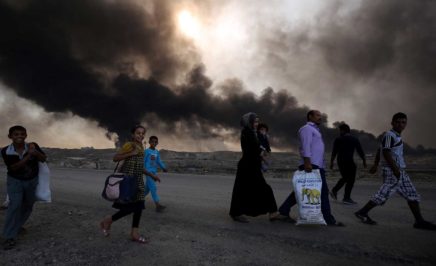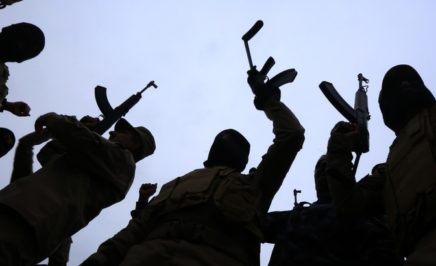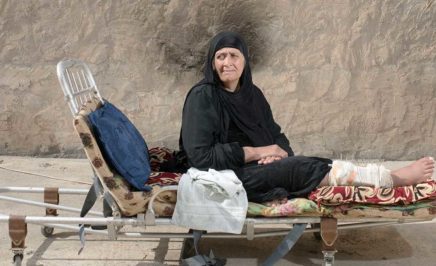Military operations to retake Mosul and the surrounding areas from the armed group calling itself Islamic State (IS) are endangering civilians who are being caught in the crossfire or in some cases being used as human shields by IS fighters.
The organization’s research team met with civilians displaced from their homes in villages north of Mosul in recent days who are now in Zelikan and Khazer camps, in areas controlled by the Kurdistan Regional Government (KRG), and conducted phone interviews with people still trapped under IS control, gathering fresh evidence pointing to civilian deaths and injuries during in recent days.
“IS’s utter disregard for the safety of civilians and their apparently deliberate use of human shields is putting people trapped in areas of active conflict at even greater risk, as Iraqi forces advance.”
Lynn Maalouf, Deputy Director for Research
“With more than a million people believed to be still trapped in Mosul and its outskirts, the risks to civilians are sky high. IS’s utter disregard for the safety of civilians and their apparently deliberate use of human shields is putting people trapped in areas of active conflict at even greater risk, as Iraqi forces advance,” said Lynn Maalouf, Amnesty International’s Deputy Director for Research at the Beirut Regional Office.
“To avoid civilians getting caught up in a bloodbath, all parties to the conflict must take all feasible precautions to spare civilians.”
By 26 October, more than 10,500 people had been displaced since the launch of coalition military operations to retake Mosul, while up to 1.5 million people are believed to remain trapped in Mosul and its outskirts.
IS use of human shields
Some civilians who managed to flee the fighting or whose villages had been recaptured by government forces told Amnesty International that IS fighters had deliberately prevented them from fleeing areas of conflict. IS fighters had embedded themselves within the civilian population, taking up positions in residential areas and in some cases, forcing civilians to move to areas under their control.
“All parties to the conflict must take all feasible precautions to spare civilians.”
“Using civilians to shield yourself from attack is a war crime. But even in cases when IS fighters are holding civilians as human shields, this does not absolve Iraqi and coalition forces from the obligation to take their presence into account, take all feasible precautions to minimize harm to civilians, and avoid launching attacks that could cause disproportionate harm to civilians,” said Lynn Maalouf.
Civilians caught in the crossfire
Relatives told Amnesty International that a farmer and father of eight from the Tab Zawa village in Bashiqa district of Ninewa Governorate, northeast of Mosul, was at home with nine family members when he was fatally wounded during clashes between IS and government forces on 24 October. Since then the village has been retaken by Iraqi forces, including the elite Golden Brigade of the Counter Terrorism Service, who evacuated civilians and handed them over to the Kurdish forces.
On the same day, two young brothers, aged six and five years old, were wounded by shrapnel while at home in Tab Zawa village. Their father told Amnesty International that a fence struck by what he believed to be a rocket collapsed on him and his two sons as they ran outside to a shelter they had dug in the garden:
“My two boys were hit, and we couldn’t even take them to any hospital or clinic because fighting raged on. We just tried to stop the bleeding and clean the wounds. On the following morning, they were transported in ambulances to a hospital in Erbil, and my oldest son had an operation on his back.”
“All parties should avoid the use of unguided rockets, artillery, mortars and other explosive weapons with wide area effects in the vicinity of concentrations of civilians. Attacks that appear likely to be disproportionate or otherwise indiscriminate should be postponed or cancelled,” said Lynn Maalouf.
“My two boys were hit, and we couldn’t even take them to any hospital or clinic because fighting raged on.” A farmer and father of eight from Tab Zawa village
Residents of Tab Zawa told Amnesty International that IS fighters used both vacant and occupied villagers’ homes and rooftops to carry out their attacks.
Civilians in the villages of Dirij and Chanchi, in Bashika district, were also caught in crossfire. A man who fled from Dirij told Amnesty International that his 17-year-old-brother sustained a gunshot wound to the leg while at home during clashes between IS and Peshmerga (Kurdish armed forces) on 22 October.
“IS fighters were based in our neighbour’s house and fired from there. After my brother was shot, we remained trapped inside the house while fighting was ongoing, and just tried to stop the bleeding… After two days, he was losing consciousness and could no longer control his body movements. We took the opportunity of an airstrike on Daesh [Arabic acronym for IS] and ran for our lives carrying him, until we met the Peshmerga. He is in the hospital in Dohuk now,” he said.
Mohamed (not his real name), a farmer from Chanchi village, told Amnesty International that he lost his wife and another 13-year-old relative on 23 October during clashes between IS and Peshmerga forces. He said IS fighters prevented them from leaving the area.
Some 70 people had gathered in one house at the northern edge of the village when mortars struck at about 1pm, according to witnesses. The 13-year-old boy died immediately as a result of head wounds and three children, aged between four and 13, were injured.
“My wife was hit just under her ribcage and, as time passed, she complained about sharp pain and her bleeding increased, until all her clothes were covered in blood. We were trapped inside as fighting wore on. She died right there and I couldn’t do anything to save her. We had asked Daesh to let us leave even in the direction of Mosul, but they refused. They shot at some of our neighbours who tried to escape”, he said.
In some cases, IS fighters forced civilians from villages south of Mosul to move to areas under their control as they retreated from Iraqi forces’ attacks. Local officials, activists and a resident of al-Qayyara district, who was able to speak to Amnesty International over the phone from an IS-controlled area, said that civilians were kept in schools, homes and other locations near IS fighters in Hamam Al-Alil after being forced to move from their homes further south.
Background
Civilians who managed to flee to areas controlled by the KRG since the start of military operations to retake Mosul and who are now sheltering in the Zelikan and Khazer are not permitted to leave the camps, except for medical treatment in cases of acute emergency. Even in such cases, no relatives are allowed to accompany the patients, including children. Such restrictions, along with the prohibition of the use of mobile phones by recent arrivals, even apply to those who have undergone security screening to determine whether they have links to IS. Kurdish authorities justify these restrictions on security grounds. Amnesty International has called on the Kurdish authorities on numerous occasions to lift all arbitrary and discriminatory restrictions on the freedom of movement of internally displaced people.








